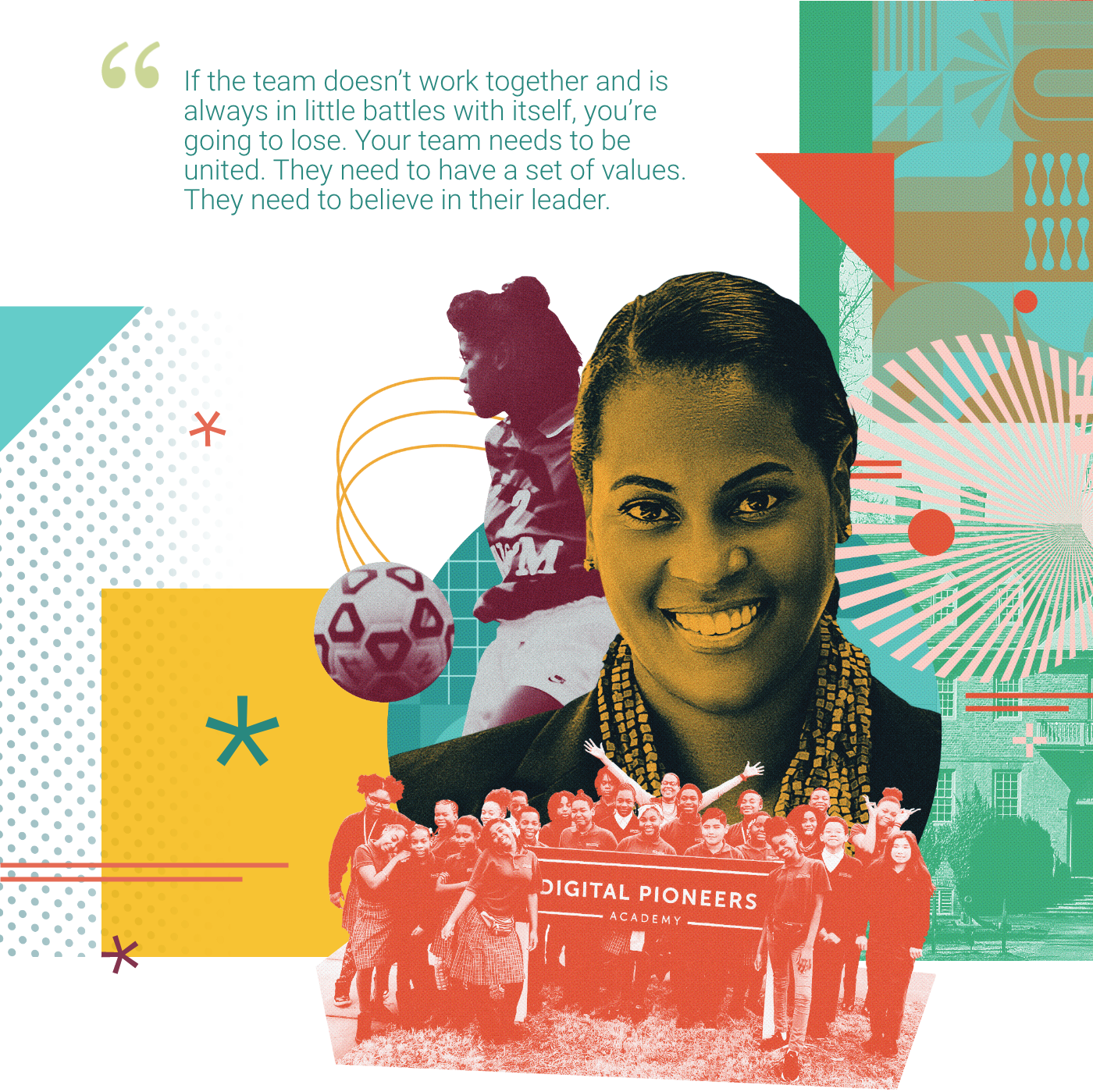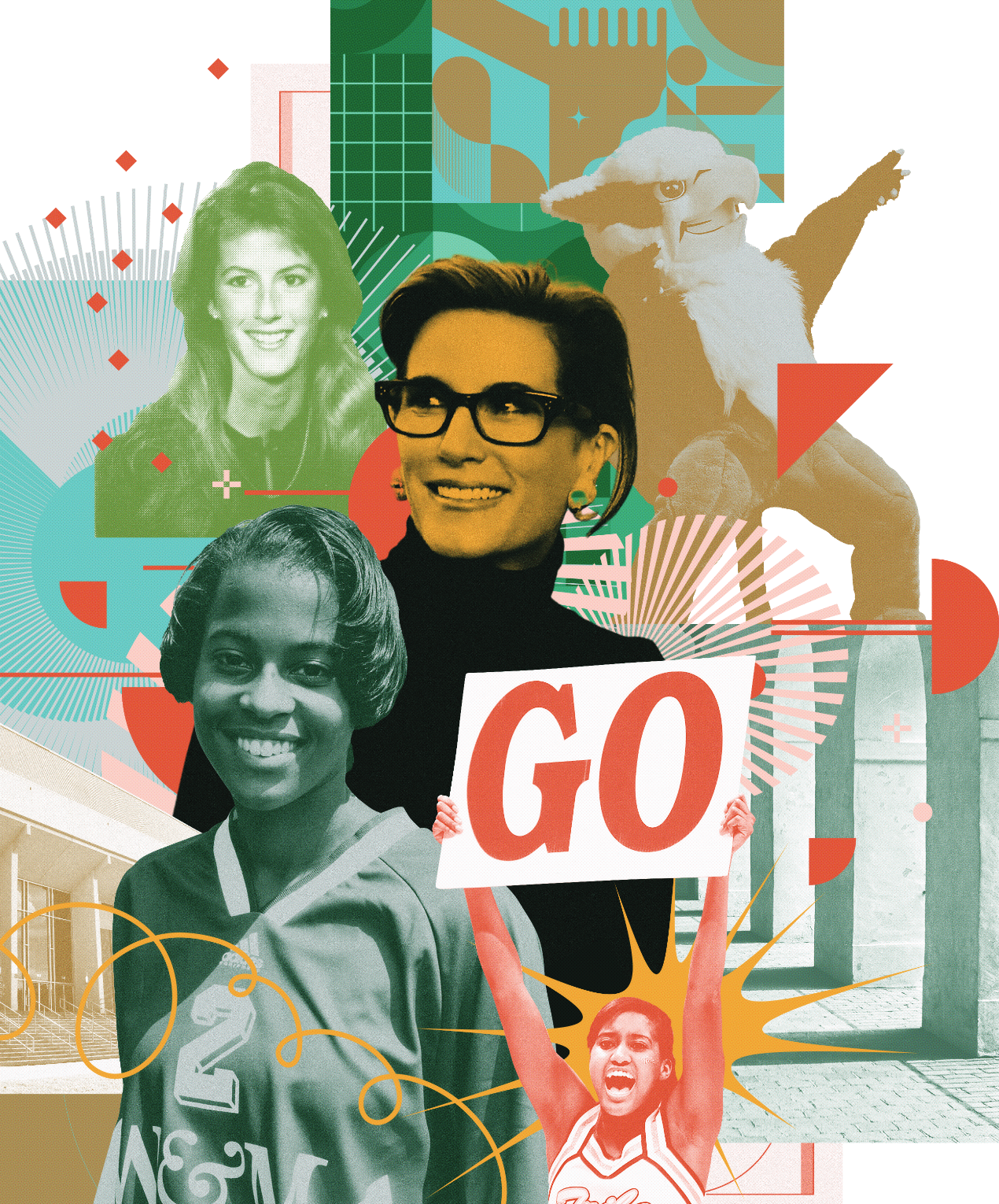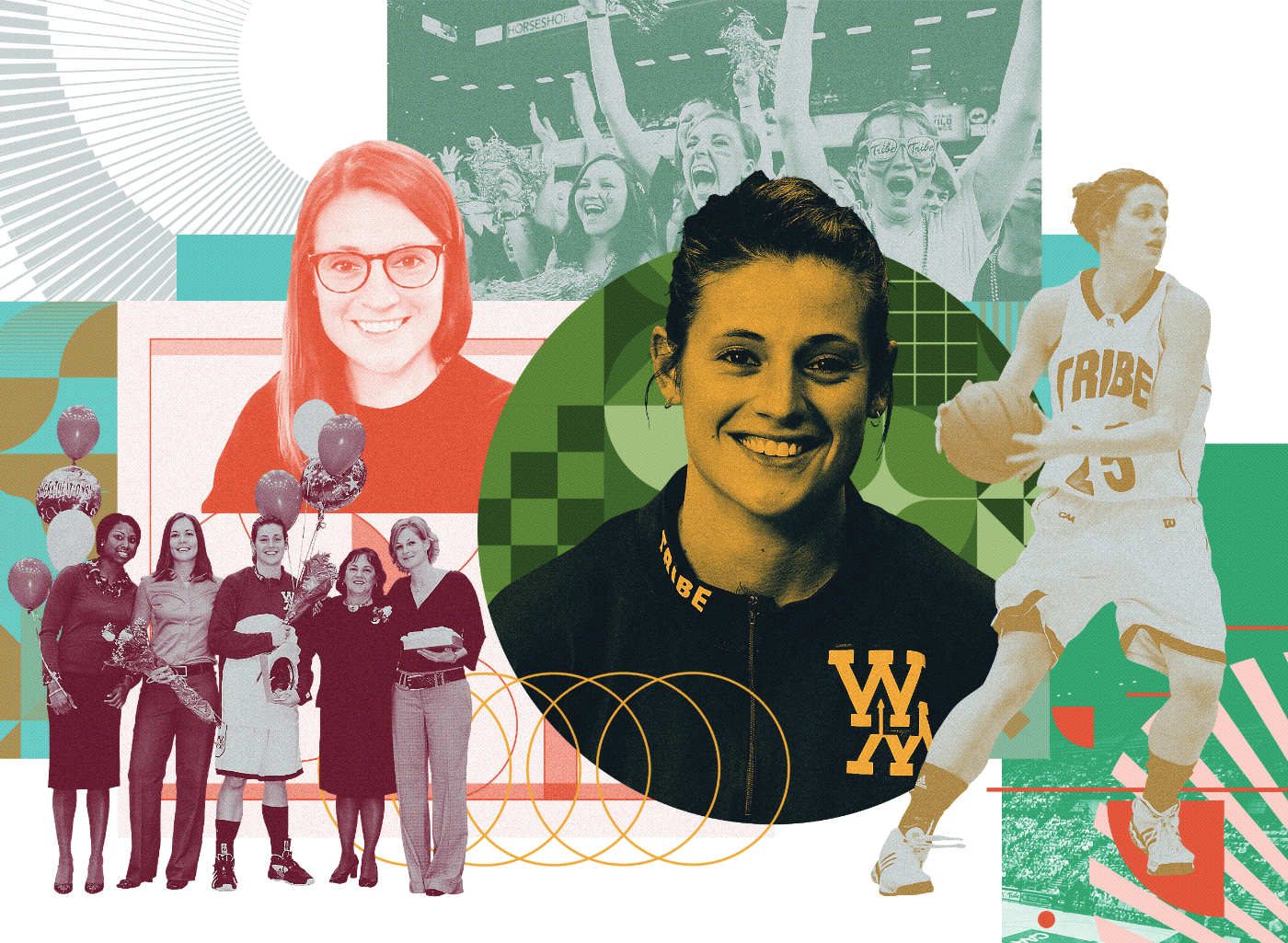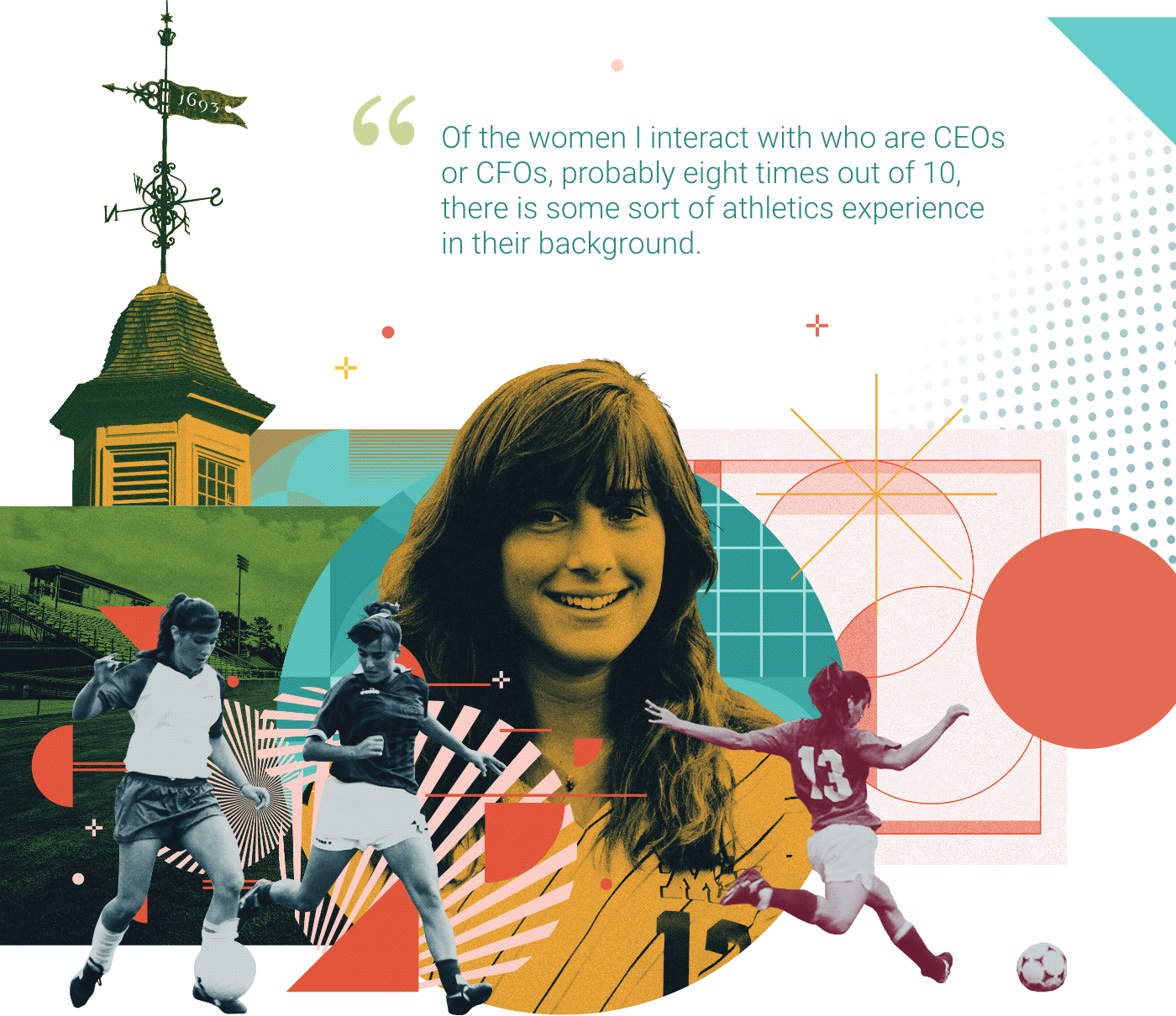MASHEA MASON ASHTON ’96, M.A.ED. ’97
At the Digital Pioneers Academy in Southeast Washington, D.C., school founder and CEO Mashea Ashton is wearing her usual Wednesday attire: a green-and-gold William & Mary sweatshirt. After all, Wednesday is College Day, and why wouldn’t the former Tribe soccer team captain represent her beloved alma mater?
Preparing students from low-income, working-class families to attend college and pursue careers in computer science is the mission behind the public charter school. Since opening in 2018 with 120 sixth graders, the academy has grown to encompass two campuses with 600 students in grades 6-11. Next year, its first seniors will graduate.
“I believe that every student rises to the level of your expectations,” Ashton says. “But data shows that for kids of color, particularly kids who live in the most under-resourced parts of the country, their educational outcomes are far below their potential. The big question I keep chasing is how to get more kids of color to achieve their highest potential by going to college and having successful careers.”
The question first came into focus when Ashton was teaching in Williamsburg while working toward her master’s degree in special education, after earning a bachelor’s degree in sociology and elementary education. One of her students was a fifth-grade boy whose behavior was getting him into trouble. A teacher on staff at the school told Ashton not to worry about him: “He’s just going to wind up in jail like his father.”
“I remember thinking, ‘Oh, gosh, this can’t be true. There must be something else out there for him,’” Ashton says.
The story of how she came to attend William & Mary — and discover her life’s mission — begins with athletics. As soon as Mashea and her twin sister, Michele Mason ’96, entered kindergarten, their mother, Brenda Mason, started making plans for the girls to go to college. Neither she nor her husband, who served in the military, had a college degree, but it was her dream to see her daughters pursue higher education.
While volunteering with the Willingboro, New Jersey, school system, Mrs. Mason told one of the teachers that her daughters needed to receive scholarships and she thought excelling at basketball might be the best way for them to accomplish that goal.
“This teacher told my mom, ‘Don’t put them in basketball, put them in soccer,’” Ashton says. “I think the idea was that there aren’t many Black girls who play soccer. If they’re really good, they will stand out and they’ll have more opportunities to get scholarships.”
So the twins started playing club soccer at age 5, and they loved it. About a decade later, their team, the Willingboro Strikers, became national champions for the under 16 age group. William & Mary was not on their radar while growing up in southern New Jersey, but they met John Daly, then the W&M women’s head soccer coach, at a Women and Girls in Soccer tournament, and he told their mother the girls should think about going to William & Mary. His suggestion was reinforced when they heard about W&M’s reputation for both high-level academics and athletics from one of their club soccer coaches whose child had attended the university.
“We said, ‘It’s our dream school. That’s where we want to go,’” Ashton says. “It’s the only school we applied to.”
She credits her experience as an athlete with honing her leadership skills and teaching her how to overcome disappointments and setbacks. She recalls that after starting most games as a freshman, she lost her spot in the lineup when a new player came in the next year.
“Why is a freshman taking a starting position?” Ashton asked Daly. He told her that he made the decision based on his assessment of how the players’ skills would contribute to the team’s success, and encouraged her to keep improving as an athlete.
“Competition pushed me to work harder,” she says. “By my junior year, I was starting. Senior year, I was picked to be captain. A big part of that was input from the coach. He reinforced that if you work hard, good things will happen.”
As she began her career in education, she carried with her the competitive spirit from the soccer team, along with lessons of resilience.
“I understood working hard and getting results from an athletics perspective, but the same perspective can apply to anything,” she says. “If you set your mind to a big goal, you work hard, you put in the effort and you believe all failure or difficulty is just feedback, you can achieve anything.”
After starting out as a classroom teacher, Ashton soon moved into leadership roles. At age 26, she became a founding member of the Black Alliance for Education Options, a nonprofit that advocated for increased choices for low-income and working-class families. She served on the board with Cory Booker, a U.S. senator who was then the mayor of Newark, New Jersey. Booker later recruited her as CEO for a $50 million fund that was set aside for charter schools in Newark. Ashton also has served as executive director for charter schools in the New York City Department of Education and as national director of recruitment for the Knowledge Is Power Program.
“I didn’t pick charter schools,” she says. “I picked leadership roles based on how to have an impact to serve kids.”
The idea of charter schools resonated with her in part because of personal experience. Her parents had moved Mashea and Michele out of their zoned public school when they were going to be held back to repeat kindergarten. They transferred to a private Catholic school, where they received additional academic support and were able to catch up with their peers.
“I believe families deserve as many high-quality choices as possible,” she says.
Working with charter schools enabled Mashea to apply an entrepreneurial approach to education, eventually leading to the founding of Digital Pioneers Academy (DPA). About 10 years ago, she and her husband, Kendrick Ashton ’98, moved from New York City to the Washington, D.C., area, where his family has lived for generations, as he was making plans to launch The St. James sports complex with friend and business partner Craig Dixon ’97, J.D. ’00.
Mashea has reconnected with her alma mater as a current W&M Foundation trustee, and former For the Bold D.C. Regional Campaign board member and W&M Alumni Association board member.
Originally, she wanted to open a middle school that would help put students on a path toward college and careers. Then she read reports saying demand for people trained in computer science was expected to far outpace the supply, and that gave her the inspiration for the academy.
“I said, ‘Let’s figure out how to close this gap,’” Ashton says. “We want our scholars to be part of creating in the digital economy.”
Taking the school from concept to opening was a major task, and challenges continue. After four of the academy’s students died from gun violence in incidents outside of school during the last academic year, Ashton began to rethink how DPA operates.
“What I’m realizing is that we can’t achieve our mission for all of these kids to go off to four-year colleges and universities and thrive in 21st-century careers unless we are also thoughtful about addressing youth violence and gun violence in D.C.,” she says.
Part of the school’s response was to launch a football team, which finished its first season this past fall. Additional sports are also being added: girls and boys volleyball, basketball and soccer. These activities give students something to do in the after-school hours and provide a way to engage families and build a sense of community.
Meanwhile, Ashton keeps her team focused on Digital Pioneers Academy’s mission, often drawing on her athletics experience.
“We have a 15-minute huddle at the start of every day with the whole staff. It’s the moment our team loves the most,” she says. “We talk about the play for the day and then we go try to win. Our mindset is we have to go 1-0 every single day. We’re not trying to win the championship in one day. We’re taking it one day at a time.”



